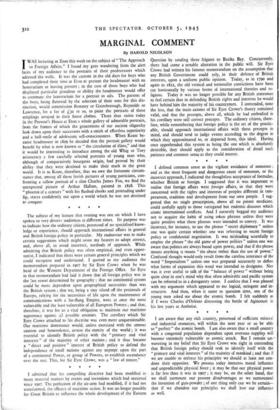The subject of my lecture that evening was one on
which I have spoken to very divers: audiences at different times. Its purpose was to indicate how the ordinary citizen, possessed of no specialised know- ledge or experience, should approach international affairs in general and British foreign policy in particular. My endeavour was to make certain suggestions which might assist my hearers to adopt correct, and, above all, to avoid incorrect, methods of approach. While admitting that British policy was often empirical, and even oppor- tunist, I indicated that there were certain general principles which we could recognise and understand. I quoted to my audience the memorandum prepared in 1907 by Sir Eyre Crowe when he was head of the Western Department of the Foreign Office. Sir Eyre in that memorandum had laid it down that all foreign policy was in the last resort determined by geography ; that no continental system could be more dependent upon geographical necessities than was the British system ; that we, being a tiny island off the peninsula of Europe, relying for the necessities of life upon the maintenance of communications with a far-flung Empire, were at once the most vulnerable and the least vulnerable of all European Powers ; and that, therefore, it was for us a vital obligation to maintain our maritime supremacy against a] possible enemies. The corollary which Sir Eyre Crowe attached to his doctrine was even more unquestionable. Our maritime dominance would, unless exercised with the utmost caution and benevolence, arouse the enmity of the world ; it was essential to identify British policy with the " primary and vital interests " of the majority of other nations ; and it thus became a " direct and positive " interest of British policy to defend the independence of small nations against any attempt upon the part of a continental Power, or group of Powers, to establish ascendancy over the rest. This, for Sir Eyre Crowe, was a " law of nature."


























 Previous page
Previous page